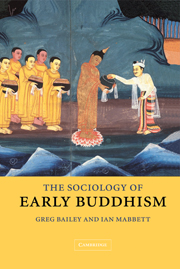1 - The problem: asceticism and urban life
Published online by Cambridge University Press: 22 September 2009
Summary
An instructive story tells of a Thai woman who had long lived in England. She became increasingly subject to a vague depression which eventually became quite disabling, until she realized what was wrong when she was introduced to a vihāra and was able to make religious offerings to the monks; it brought instant release from her burden of worries. ‘That is what is wrong with living in this country,’ she said. ‘There are simply no opportunities to give.’ Much could be learned from contemplation of this parable, but one simple fact matters here: the role of the Buddhist Order makes sense in a particular social environment with a particular culture, in terms of which people see each other and behave towards each other.
How, then, did Buddhism grow in the India of about 500 bce? This India was not like modern England; it was not like modern Thailand either. So what sort of environment was it that shaped the emergence of the dhamma and the behaviour of the monks? What strikes the historian most is that cities were growing, many of them capitals of rising kingdoms. Agriculture and trade networks were developing. This environment must have been relevant to the appeal of Buddhism, and of the other new non-brāhmaṇical teachings.
Did the dhamma make sense to people because in some way it fitted the needs of these rising urban states? Or did it provide instead a spiritual salve, an opiate, for those who suffered from the effects of urbanization?
- Type
- Chapter
- Information
- The Sociology of Early Buddhism , pp. 13 - 36Publisher: Cambridge University PressPrint publication year: 2003



